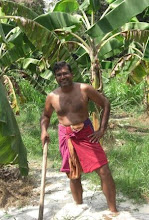
My usual route into Colombo for my weekly sales and deliveries results in my passing the parliament road that circumvents the National Assembly that is housed in a man made island in the middle of Diyawanna Oya. Owing to the budget debates now going on, the road is closed to my vehicle which comes under the category of a heavy goods vehicle. This means that I have to double back and get into more traffic, which delays my journey more than I would like.
I was commenting today, that parliamentarians on both sides, if one reads what is being said in the press, are in a jostling match amongst each other with very little regard to the needs, concerns and aspirations of the electors who put them there. It is either a slanging match on who can shout the loudest. Those who are actually doing much of the talking are full of themselves and not much else. It is like 'Nero is talking to the gods about all the good he is doing while Rome burns' kind of situation.
The comedy is further exacerbated because the police who are busy on all the approach roads, act as if each convoy that comes brings the president, as they are not told who the vip is on their way in. As there are over 100 ministers, the police give the same servile treatment to all and the Johnny come lately who is on his way to parliament is chaffed at the royal treatment meted out at the expense of the exasperated and long suffering motorist.
What is said and expounded on the floor of the house matters to no one, as what is said is meaningless, listened to by hardly anyone and reported only if the level of comedy rises to new highs. The results of the votes bear no relation to what is said in there.
I liken it to a foot and mouth disease that our lawmakers have, who are oblivious to the plight of the people they represent. Parliament consists just of yes men obeying their leaders with few who have the guts to come clean and talk sense. There is hardly anyone without dirt sticking to them. Even the muddied paddy farmer being visually cleaner than them.
The public are apathetic to protest or are in fear of protesting at these antics, for being incorrectly branded by the most corrupt as being unpatriotic. This is something to be concerned about.
Does no one see this drama for what it is and do something about it? or are we forever to be consigned to the scrap heap of history? We will be branded as a spineless populace with no backbone that allowed our lawmakers to ride roughshod over this land, and permanently disfigure its core.Lets not at all worry what others think of us, and only care about what they have done to the people living here, and the pathetic example they have shown.
This sums up parliamentary democracy Sri Lanka style. Keep the foot in the mouth and we will really be OK.

